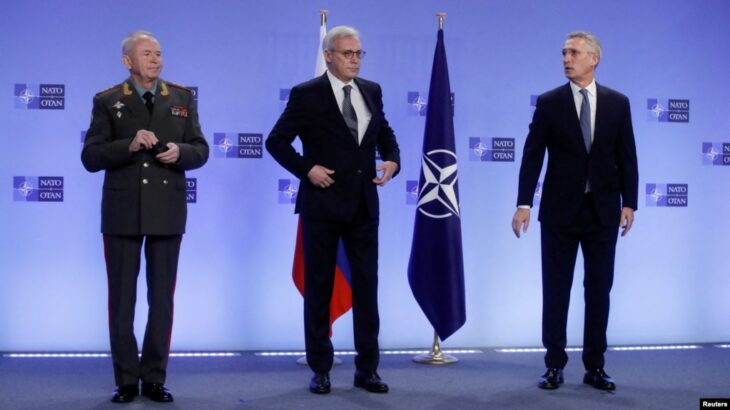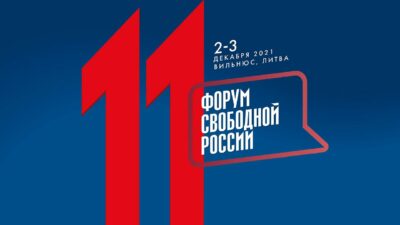
NATO Secretary-General Jens Stoltenberg says the military alliance had a “serious and direct exchange” on the issue of Ukraine with Russian officials, and that he hopes more talks will be possible.
Speaking after a four-hour meeting with a delegation from Russia as part of the NATO-Russia Council on January 12, Stoltenberg said that the talks on a wide range of issues were useful and that the Western security alliance will make every effort to find a political way forward with Moscow on European security.
Stoltenberg said NATO expressed “serious concern” over Moscow’s buildup of nearly 100,000 troops near Russia’s border with Ukraine and in the occupied Crimean Peninsula in what the United States has said could be a prelude to an invasion.
“There are significant differences between NATO allies and Russia on this issue,” he told reporters after the talks at the alliance’s headquarters.
“Our differences will not be easy to bridge, but it is a positive sign that all NATO allies and Russia sat down around the same table and engaged on substantive topics.”
He also underlined again that Ukraine has the right to decide its future security arrangements and that NATO’s doors are open to the possibility of admitting new members.
“No one else has anything to say, and of course Russia does not have a veto,” he said.
The January 12 meeting between representatives of the alliance’s 30 members and Moscow’s envoys took place under the framework of the NATO-Russia Council, the first time the group has met in more than two years.
It was the second round of high-stakes diplomacy this week following an initial meeting between U.S. and Russian negotiators in Geneva on January 10 that proved inconclusive.
Stoltenberg and the leaders of the Russian delegation, Deputy Foreign Minister Aleksandr Grushko and Deputy Defense Minister Aleksandr Fomin, posed stern-faced for the media before the start of the meeting.
Deputy Secretary of State Wendy Sherman, the top U.S. negotiator at the Geneva talks, also took part in the discussions in Brussels as the leader of the U.S. team.
Grushko has described the meeting as “a moment of truth” in Russian-NATO relations.
Kremlin spokesman Dmitry Peskov reiterated that Russia, while not issuing ultimatums, remained concerned about the Western alliance’s possible enlargement.
“Of course, Russia is concerned over any NATO expansion. NATO is not an instrument of development, it is an instrument of confrontation,” Peskov told journalists in Moscow.
The NATO-Russia Council was set up two decades ago but full meetings were suspended after Russia seized Ukraine’s Crimean Peninsula in 2014. The council has met only sporadically since, the last time in July 2019.
The Kremlin’s troop buildup near Ukraine and concerns that Russia could be preparing to launch a fresh incursion into Ukrainian territory were at the top of the agenda.
Western officials and analysts say Russia’s massive troop buildup near the border with Ukraine is an attempt to pressure the United States and European allies to make concessions.
The NATO-Russia Council meeting was expected to consider Moscow’s demand that NATO commit to ending its eastward expansion and roll back advances it has made in Central and Eastern Europe since the 1990s.
While expectations are low, NATO is hoping to draw Moscow into a sustained dialogue and stave off military escalation. Stoltenberg said this week that a good outcome would be an agreement for further meetings.
Ahead of the meeting, Sherman rallied NATO allies after her conversations with Russian Deputy Foreign Minister Sergei Ryabkov.
“The United States is committed to working in lockstep with our allies and partners to urge de-escalation and respond to the security crisis caused by Russia,” she said.
Sherman also held talks in Brussels on January 12 with Stefano Sannino, the head of the European External Action Service — the diplomatic service and combined foreign and defense department of the European Union.
Sherman and Sannino “reaffirmed the United States’ and EU’s unwavering support for Ukraine’s sovereignty and territorial integrity. They discussed our united approach to Russia’s unprovoked military buildup along Ukraine’s borders,” State Department spokesman Ned Price said in a statement.
Speaking after the January 10 talks and ahead of his return to Brussels, Grushko said Russia would demand a comprehensive response to its demands.
“We will push for a concrete, substantive, article-by-article reaction to the Russian draft agreement on guarantees,” he added.




